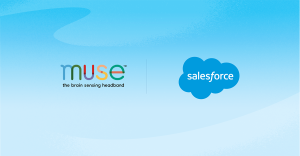5 Questions With . . . Muse: the brain sensing headband by Interaxon Inc.



Toronto-based Interaxon Inc. enables personal transformation through human-centered technology to help people live happier, healthier and more connected lives. Its flagship product, Muse: the brain sensing headband, is a personal meditation assistant that provides real-time audio feedback on your brain activity while meditating.
The stresses, pressures and sheer volume of issues entrepreneurs have to think about every day can make it difficult to stay focused, let alone appreciate the present moment. That’s one of the reasons small and medium-sized business owners might find themselves turning to a practice like meditation — and if they can’t seem to control all the thoughts running through their heads, turning to Muse: the brain sensing headband might be the perfect solution.
Toronto-based Interaxon Inc. enables personal transformation through human-centered technology to help people live happier, healthier and more connected lives. Its flagship product, Muse: the brain sensing headband, is a personal meditation assistant that provides real-time audio feedback on your brain activity while meditating. Calm mind? Calm weather. Busy mind? Stormy weather. The company’s technology works much like how a heart monitor senses a heartbeat, detecting brain activity and helping users get the most out of each meditation session through real-time feedback.
Interaxon has helped small business owners through its products and services and continues to set itself apart as a fast-growing Canadian company. As an established leader in the neurotech and meditation space, we wanted to gain more insights for our special blog series that celebrates Small Business Month across Canada and spoke with Jacqueline Cooper, the company’s chief revenue officer.
1. How do You Define Your Company’s Purpose or Mission?
Our core mission is to enable personal transformation through human-centered technology. We really want people to live happier, healthier and more connected lives. Meditation has been shown repeatedly, in peer-reviewed studies, to contribute to improvements in mental wellness. An ongoing meditation practice can help improve overall well-being, focus, and performance. That’s important because, typically, we are all multi-tasking. We’re looking at our phones multiple times a day. We’re not connecting with those around us. We’re always in a state of “somewhere else.” If we can teach people to come back to a place of focus, we feel we can help people live healthier lives. Self-care is not just physically working out or eating well but working on wellness at all levels.
2. What are Some of Your Biggest Priorities or Objectives Right Now?
As chief revenue officer I’m not only focused on revenue growth but also bringing people into the practice, and knowing our customer so we can build better content and services for them. We’re not only a hardware manufacturer; we also have a software-as-a-service business. For example, our Meditation Studio brand has more than 500 meditation sessions offered through more than 50 teachers — and we’re looking to integrate that to become your overall personal meditation assistant. Internationalization is also key for us — we’ve added new languages including French, Spanish, German, Italian and soon Japanese in the coming weeks.
2. What are Some of The Biggest Challenges You’ve Had to Overcome?
As an SMB we manage under scarcity, maintaining focus under the ‘wealth of opportunities problem’ and selecting the right strategic partnerships. But at the end of it, our customers are what drive our success, and managing their expectations of our products and services is what needs to direct us. As we bring the business to scale, we need to ensure that our vision and strategy are aligned across all teams.
4. How has Technology Contributed to Your Firm’s Success?
We’ve recognized the importance of finding the right products and tools that allow us to engage our customers on their journey. Our customers could be an individual, a corporation, or even a sports team. We want to be able to know who they are. Our core technology, for example, was built off of applying machine learning in the cloud to improve the user’s experience. Everybody’s brain is different. Muse is similar to having a personal meditation assistant.
We’ve migrated our customer service data into Salesforce, using Service Cloud, and are making use of artificial intelligence tools like Einstein via Saleforce Sales Cloud. When Muse customers have committed to buying the product, we can send them emails to encourage their meditation practice. It’s like signing up for a gym membership — if you take a class or get some personal training, you’re more likely to go.
5. What Kind of Advice Would You Offer to Other Growing Small Businesses?
Know your customers. Know them intimately. In the early days, your customers are going to grow your brand. You could spend a lot of time on brand (marketing), but in the end, your customers are going to seek your product, and be your largest advocates.
Be prepared to iterate and make sure all teams understand the value of customer feedback. When we launched Muse four years ago, we wanted to make meditation easy by providing real-time feedback. My advice – create awareness and then ignite your brand with your potential customers. You have to be integrated and make sure that a strong tide raises all boats. And, if you see something catching fire, put fuel on it.























